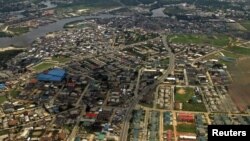Nigerian officials announced a $4.5 billion deal that will see the country partner with U.S. company Vulcan Petroleum Resources to build six oil refineries in Nigeria, Africa’s biggest oil producer.
Vulcan said its goal is to build the first two facilities within one year and complete all six within the next 30 months. It said the various refineries will be located at different sites throughout the country.
Umaru Dembo, a former Nigerian energy minister, said the announcement was a welcome development for the country.
“It means quite a lot… because, up to now, we seem to be dependent on refined oil from somewhere else… the three or four refineries that we have now do not supply the needs of refined products that Nigeria needs at the moment,” Dembo said.
Though Nigeria produces more crude oil than any other nation on the continent, it relies heavily on oil that is refined abroad in order to fulfill domestic energy demands. Nigeria exports more than two million barrels of crude oil a day.
Dembo added that the current refineries in the country produce more than 400,000 barrels of oil a day, and the reported 180,000 barrels a day that the six new refineries would produce is a surprisingly low number. But, he added, it was better than the alternative.
“It is better to get the refineries and have them working then have no refineries at all…than [to have to] depend upon refineries outside Nigeria,” he said.
According to Dembo, the new refineries, which are slated to all be finished in about two and a half years, could have additional benefits for the local economy.
“Definitely, it will mean more jobs for Nigerians if this comes to fruition,” he said. “There’ll be very many things that will be available for the people… we hope there will actually be electricity.”
In January, mass protests were staged throughout the country when the government said it was going to remove the oil subsidy, which was the only benefit many Nigerians said they enjoyed from the nation’s oil wealth.
After a nationwide strike and continued protests, the government later announced a partial rollback of the price hikes.
President Goodluck Jonathan has said Nigeria can no longer afford the $8 billion fuel subsidy. He promised to use the money saved for needed infrastructure and social programs.
Vulcan said its goal is to build the first two facilities within one year and complete all six within the next 30 months. It said the various refineries will be located at different sites throughout the country.
Umaru Dembo, a former Nigerian energy minister, said the announcement was a welcome development for the country.
“It means quite a lot… because, up to now, we seem to be dependent on refined oil from somewhere else… the three or four refineries that we have now do not supply the needs of refined products that Nigeria needs at the moment,” Dembo said.
Though Nigeria produces more crude oil than any other nation on the continent, it relies heavily on oil that is refined abroad in order to fulfill domestic energy demands. Nigeria exports more than two million barrels of crude oil a day.
Dembo added that the current refineries in the country produce more than 400,000 barrels of oil a day, and the reported 180,000 barrels a day that the six new refineries would produce is a surprisingly low number. But, he added, it was better than the alternative.
“It is better to get the refineries and have them working then have no refineries at all…than [to have to] depend upon refineries outside Nigeria,” he said.
According to Dembo, the new refineries, which are slated to all be finished in about two and a half years, could have additional benefits for the local economy.
“Definitely, it will mean more jobs for Nigerians if this comes to fruition,” he said. “There’ll be very many things that will be available for the people… we hope there will actually be electricity.”
In January, mass protests were staged throughout the country when the government said it was going to remove the oil subsidy, which was the only benefit many Nigerians said they enjoyed from the nation’s oil wealth.
After a nationwide strike and continued protests, the government later announced a partial rollback of the price hikes.
President Goodluck Jonathan has said Nigeria can no longer afford the $8 billion fuel subsidy. He promised to use the money saved for needed infrastructure and social programs.





